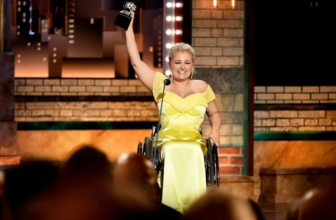“Just Google it.” Chances are you’ve used that phrase this week. Google has become a verb, the act of looking up something via search engine. Yet we often take search results for granted. We don’t stop to think about what we are being shown and why. We almost never wonder about what we're not seeing and whose voices are being left out. We should.
As an entrepreneur with cerebral palsy, I’ve spent most of my career battling low expectations and negative attitudes to advocate for the disability community. But for the past few years, I've been fighting a new form of bias I never expected to encounter: algorithms.
Recent changes to Google's algorithm, especially the so-called Helpful Content update, have had a devastating impact on The Ability Toolbox and many other small websites. It's never been easy to keep a small business going, but this existential threat is shining a light on broader, longstanding problems with how Google values content created by disabled people.
Who decides who should be considered an expert on a marginalized community? What do you do when an algorithm thinks your voice is less important than that of someone who isn't part of your community? That's what we face as disabled people. The Google Helpful Content update and E-E-A-T algorithms are fundamentally biased against people with disabilities who have lived experience authority on our lives. It's time to talk about it and demand change.
The TL:DR
Are you short on time because you have 5 jobs to survive our dystopian hellscape economy? Here's the short and simple version of this long read.
Google uses algorithms to determine which websites appear at the top of search results. These algorithms have biases that make it hard for small websites that represent minority and marginalized communities to be seen. This is especially true for the disability community, because our stories get categorized as medical content even though they're not. Google only wants articles written by experts to rank for medical care, which to them means doctors, but disabled people are experts on our own lives and we shouldn’t be devalued by algorithms.
Recently, Google released a “helpful content” algorithm update that has made things even worse. Many small websites including The Ability Toolbox have lost most of their traffic and are struggling to survive. We need your support to stay afloat and to advocate for algorithms that value peer experts and small businesses.
E-E-A-T, YMYL Content, and Disability
“E-E-A-T” is a Google acronym that stands for Experience, Expertise, Authority, and Trustworthiness. It is implemented through both human Quality Raters and algorithms that attempt to assess these factors when ranking a website in search. Both are flawed when it comes to assessing expertise and authority in the disability realm.
Google generally files disability under the “health” category, meaning it is considered YMYL content — your money or your life. Websites that cover YMYL topics such as health and finance are subject to extra scrutiny by Google. This isn't inherently bad; I think most of us can agree that quack cures and investment scams don’t belong at the top of the search results. The problem lies in how Google determines whether content is YMYL and who counts as an authority on that content.
To rank what it views as YMYL content, Google attempts to assess whether articles are written or reviewed by “experts.” In the case of “health” topics, “experts” are deemed to be medical professionals — doctors, nurses, physical therapists, etc. This is extremely damaging to the disability community both in theory and in implementation, as it assigns control of our voices to people who don't share our experiences and frequently hold outdated and negative views of us.
Why Doctors Often Aren't Experts on Disability and Chronic Illness
If you’re not disabled, you may be surprised to learn that when it comes to understanding the everyday lived experience aspects of disabilities, doctors are often the exact opposite of experts. Studies have shown that over 80% of doctors believe that people with disabilities have a poor quality of life, and only 40% feel confident about their ability to treat disabled patients. And it would take a dozen paragraphs to begin to address how poorly people with invisible disabilities and chronic illnesses are often treated by medical professionals — one of our writers explained it well here.
As someone who has a degree that Google would consider valuable, a Master's in Psychology, I have learned far more about the mental health aspects of having a physical disability from living with one than I ever learned in grad school. As is common with graduate psychology and social work programs, disability was barely touched on in our classes. I was often the one bringing it up and educating my classmates and even professors.
It’s difficult for people with disabilities and chronic illnesses to find a supportive doctor or therapist who isn’t strongly influenced by society’s ableism. Even if we do, they still won't have the everyday problem-solving knowledge we can only learn from connecting with others like us. Yet an average medical professional is often considered more of an expert on us than we are on ourselves — and now algorithms are reinforcing those biases.
How E-E-A-T Devalues the Disability Community and Lived Experience
E-E-A-T as currently implemented is incorrectly categorizing disability content as medical content. Disabilities, whether they be physical or mental, are more than just medical conditions. They are part of people's identities and affect how we are perceived in the world. Disabled people have our own community and culture that is heavily focused around civil rights and fighting for equitable housing, transportation, employment, and support services so we can live independently in our own homes instead of medical facilities.
The social model of disability frames disability as a marginalized identity and says that our limitations are primarily the result of discrimination and inaccessibility, not our medical conditions. For example, if a person in a wheelchair can't enter a store with a step, the problem is the store violating their rights by not installing a ramp, not the person's spinal cord injury. As a wheelchair user myself, I would consider a story by someone who encountered such a barrier and took action to be extremely helpful. But an algorithm can't evaluate lived experience or decide when it means more than degrees or titles.
To make matters worse, it’s possible that publishing personal experience stories could damage the rankings of a website because of a little something Google likes to call the helpful content algorithm.
The Mysterious and Arbitrary Helpful Content Algorithm
The Google Helpful Content algorithm is supposed to identify genuine and useful information and improve its search rankings. Here’s a quote from their guide to what they consider helpful content: “Does the content present information in a way that makes you want to trust it, such as clear sourcing, evidence of the expertise involved, background about the author or the site that publishes it, such as through links to an author page or a site's About page?”
Most of the guide is perfectly reasonable — of course, writers should cite sources and explain why they are experts on a topic. However, expecting authors to disclose their real identities and algorithmically tracking them across the internet silences the voices of the most marginalized in our community, and in other communities as well. There is still tremendous stigma attached to disability, especially mental health conditions, so many writers are not comfortable using their real names. Several of our writers on The Ability Toolbox have written for large, authoritative publications, but they use another name here because they fear losing their jobs or being socially alienated for sharing that they've been hospitalized for a mental illness, are in recovery from substance use, or live with debilitating chronic pain.
What makes the helpful content rules particularly disturbing is that Google punishes websites for publishing articles that run afoul of their algorithm. According to their guide, “The system automatically identifies content that seems to have little value, low-added value, or is otherwise not particularly helpful to people. Any content—not just unhelpful content—on sites determined to have relatively high amounts of unhelpful content overall is less likely to perform well in Search.”
You'd think that with such strong statements against unhelpful content, Google would clarify what it is, but aside from a few obvious examples such as false information and misleading headlines, they don't. Most critically for sites like The Ability Toolbox, how does content that isn't so-called expert verified affect content that is? Is a personal experience story written under a pseudonym neutral content in Google's eyes, or will it actively harm our other pages? If Google doesn't consider our articles that contain medical content authoritative enough, is it therefore throwing an algorithmic wet blanket over our entire site? That's what seems to be happening, but we have no way to know for sure, because there is no transparency.
Authoritative, Helpful Content and Disability Experience Stories
Google's algorithms have been fairly successful at identifying factual, structured informational content. Google can understand if you're looking for medical information. To an extent, it can understand if you're seeking practical advice for how to solve a problem you’re experiencing, though it lacks a process to assess peer experts. But it completely lacks the ability to provide what disabled people often need most — the knowledge that we're not alone in our personal and emotional experiences of being diagnosed and living with a life-changing physical or mental condition. That comes from reading stories from people who’ve been where we are — regular people without any “authority” other than living with a condition and learning how to cope in ways medical professionals would never dream of.
Here are two examples of personal experience stories we've published:
Chronic Pain Is a Pain in the You Know What and Getting Help Is Complicated (note how the author has had terrible experiences with doctors)
Being Bipolar: A Patient's Firsthand Account
As best I can tell in seven years of working in disability media, including for a large health website whose raison d'etre was personal experience stories, these kinds of articles almost never rank in search. They can’t be easily categorized or analyzed by machines because what they express is uniquely human. The very reason they are helpful is also why Google doesn't know what to do with them.
Even though they don't rank in search, I pay writers for personal experience stories because I believe they have inherent value. There are other ways to reach people with them, such as social media. But to keep the website online, we've had to focus on articles that Google's algorithms can understand.
The Ability Toolbox publishes many practical advice articles that are organized using subheadings and detailed factual information. (Here is an example.) We write for the disability community and to educate the general public, but we structure articles so search engines can process the information and rank them. We publish some articles that are purely informational, and some that recommend products using affiliate links, because that is one of the only ways small websites can earn revenue. Despite barriers related to E-E-A-T and who counts as an expert, I've been able to get some of our articles to rank in the top 10 of search results. This is what Google has always wanted — until now.
Google's “Helpful Content” Update and the Algorithmic Destruction of Small Businesses
In September 2023, Google made an unprecedented change to its “helpful content” algorithm that has devastated specialized online publications. A subsequent update in March 2024 has made things even worse. As thousands of posts on X/Twitter and every SEO Facebook group and subreddit can attest, these algorithm changes have taken a knife to the jugular of small websites run by people who are passionate about their area of expertise.
People who have spent years writing great content and building a community have had their traffic decimated in favor of old Reddit and Quora posts. Fluff articles on big media properties are outranking genuine, detailed information on specialized websites. And there is evidence that we have been deliberately targeted, as Google engineers on X have made disparaging comments about small websites.
Google's massive algorithm change has impacted small businesses in a wide variety of fields, but by their nature, websites by and for marginalized communities are disproportionately affected. We don't have the budgets to pay for lots of advertising, and we're not well-known enough to have the magic algorithmic stamp of approval as an “authority” website. Our only way to be seen on Google is to write interesting and helpful articles that are optimized to rank well in search. Now Google has arbitrarily decided to devalue our efforts and provided no clear answers or path forward.
Without rankings and search traffic, The Ability Toolbox won't survive — and neither will I. Like many small website owners, I rely on income from affiliate links and advertising to pay my bills. Google's most recent update has destroyed The Ability Toolbox — traffic is down over 60%, and revenue by 80%, as most of our pages with product recommendations were badly hit.
Imagine trying to operate a business under these conditions! Our livelihoods can be ripped away by a simple algorithm change by a company that holds a monopoly on our ability to be found.
The Uncertain Future of Small Websites
A year ago, I was laid off from a job I'd held for 6 years and loved, along with most of my department, and I was crushed. But I had started The Ability Toolbox, so I decided to use the opportunity to focus on it full-time.
Just a few weeks ago, everything was wonderful. I was making enough to live on and the site was growing. I was going to write an article about how I pushed forward and made my own way. Now, the future is uncertain for The Ability Toolbox and thousands of other websites like it.
There are things you can do to help me right now, and I would certainly appreciate them, but this article is about more than just The Ability Toolbox. It’s about a systemic devaluation of independent websites and marginalized communities that used to have a somewhat more equal footing on the Internet. The web was really the only place where we could be heard, and still is, but it’s getting more difficult.
What You Can Do to Help Small Websites
If you're reading this and want to do something about it, here are some things you can do.
Report bad Google search results.
The new algorithm is bad for searchers too, not just small websites. Are you getting 13-year-old forum posts and Reddit threads for every search? Complain to Google. It’s remarkably easy.
To the right of every search result, you’ll see three vertical dots. Click on them and you’ll get a pop-up window with more information and options. Scroll down to the bottom and you’ll see a link to Send Feedback. Click it and you’ll be given a form to submit your feedback and capture a screenshot of the results. Tell them you don’t want to see forum results if you didn’t ask for them, and/or explain why the search result is outdated or not helpful. It certainly can't hurt, and if they get a lot of complaints, it might have an effect.
Use another search engine.
Change your search engine to vote with your feet and tell Google that you don’t like what they’re serving.
DuckDuckGo is a wonderful privacy-oriented search engine that doesn’t track your usage. It is still showing useful search results that give small websites a fair shake. I highly recommend giving it a try!
Ecosia is a search engine that funds the planting of trees around the world. It offers great search results, too!
Bing is also still showing good search results, though they have many of the same privacy issues as Google.
Donate money, time, and/or writing to your favorite independent websites.
I've had a donation box on The Ability Toolbox forever, but I’ve never pushed it because I feel weird about asking for money when we are not a nonprofit organization. And yet millions of people have Patreon accounts and make their living that way. It’s just hard to ask for money. So whether it’s The Ability Toolbox or your favorite LGBTQ or BIPOC-centered website that is suffering after this update, toss a bit of money their way. You can donate to The Ability Toolbox here.
If you can’t donate (I get it, nobody has extra money right now, and many in our community rely on Social Security and other safety net programs just to get by) donate your time. I can’t afford to pay writers for articles right now, but I’ll still accept donated articles. I'm also looking for volunteers to help run support groups on the site, which I've been wanting to do for a while now. And if you're an SEO guru who can save the site without charging me a fortune, the mailbox is open.
Link to your favorite websites.
Do you run a blog or website? Do you have an old journal you haven’t updated in years? You can help The Ability Toolbox and other small websites with just one minute of your time by simply linking to us. Links are a ranking signal for Google, serving as recommendations to tell them a website is high-quality. So dig out that old password and add a few links to your favorite small businesses and nonprofits. It can really make a difference!
Support legislation to restrict monopolies and require transparency about how algorithms function.
I have never been a big fan of regulating the Internet, but at this point, it is needed. Too few companies have too much control over what we can find and see, and it needs to change.
Large companies shouldn’t be able to dominate the Internet landscape and make it difficult to use alternative search engines or otherwise favor their own products. They also shouldn't be allowed to make massive algorithm changes that affect a business' visibility without prior notice and a detailed explanation of how the new ranking criteria will work.
I can already anticipate one piece of feedback I will get on this article: stop relying on Google. Well, I would love to, but none of us have that luxury. It’s by far the leading search engine. Our search positions on DuckDuckGo and Bing are still great, but that doesn’t help much when the vast majority of people use Google.
I’m one person running a small business. I can’t use every single possible marketing channel. I share posts on social media, but Facebook no longer gives good visibility to posts with links. On Instagram, you have to rely on someone copying and pasting the link or going to your bio, and realistically, most followers don’t do either of those things.
I'm a writer by profession and by passion, so I've focused on SEO and organic search traffic, and what I've done has worked well until now. If you're an SEO guru and decide to pick apart my site, you WILL find things that need improvement. I was and am working on them, and I always appreciate constructive feedback. But none of the things that could be better should be enough to destroy my traffic, and none did until September 2023. The fact that a monopoly decided to pull the rug out from under me and many other small website owners is not our fault, and we deserve accountability and transparency.
If You Work at Google
If you are a Google employee, listen to the voices of small business owners who are telling you that this “helpful content” update is destroying us. No previous algorithm change has caused so much harm to legitimate websites. You need to reverse it.
Small websites do not have the ability to spend a fortune on making everything perfect. A whole website shouldn't be demoted over a few articles an algorithm doesn't like. Affiliate links are not bad — they allow niche websites to survive while recommending useful products to our community.
Most importantly, marginalized and minority communities have collective knowledge and wisdom your algorithms can't measure. YMYL does not accurately assess what is most helpful to us. Although the helpful content update has brought these issues to a head, E-E-A-T and algorithms have been biased against us for years. Our expertise and lived experience need to be valued regardless of whether we have degrees or certifications.
In Conclusion
Throughout the history of the disability rights movement, our mantra has been “Nothing about us without us.” We are the experts on our own lives. It’s hard enough to get the world to understand that. We shouldn’t have to battle algorithms for our voices to be heard.
Support your favorite small websites. They need you now more than ever.
Disturbed by this? Prepare to be further horrified by the recent news that Chat GPT and other AI programs perpetuate racism in medical care.
Founder and Editor-in-Chief of The Ability Toolbox. I received my BA in English from Stanford University and MA in Clinical Psychology from Antioch University Los Angeles, and have worked in entertainment and health media for over 20 years. I also blog about traveling with a disability. As a wheelchair user with cerebral palsy, I am deeply committed to amplifying the voices of the disability community through writing and advocacy.








Start the discussion at community.theabilitytoolbox.com